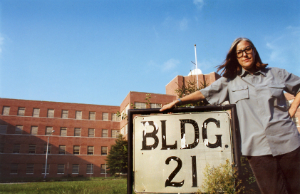CA Voices #14: Lucy Winer
At this year's 10th Annual NYC Mental Health Film Festival we are excited to be hosting filmmaker Lucy Winer, creator of Kings Park: Stories of an American Mental Institution. Lucy was committed to Kings Park State Hospital as a teenager in the 1960s. Through her documentary, she confronts the intense emotions she has carried since, and embarks on a journey to find answers. She talked with me about what it was like to make the film and how it changed from being a personal story to a story about the hospital itself.
When I met Lucy in her home office, surrounded by books and papers and sticky notes stuck to her Mac desktop, I felt I was getting a great insight into the life of a busy and successful filmmaker. But it was only as we started talking that I realized what an extraordinary personal story she has to tell. It was around her 50th birthday, she told me, that she first decided to revisit her past as a patient living in the women's ward at Kings Park. Here's how she described it.Lucy Winer
Filmmaker & Film Festival Special Guest

It wasn’t until my mid-forties that I began to question my past. I suddenly realized, oh my God, I spent two and a half years in different psychiatric hospitals and six months at Kings Park. What the hell was going on? What was wrong with me?
One day, on the eve of my 50th birthday, I made a very impulsive visit to the state hospital. Being there for the first time after so long was unbelievably exciting and terrifying all at once. At that moment I realized I needed to do two things: one, make a documentary about my story, and, two, find others who were in the hospital with me. There had been over five-thousand people in that hospital with me. Where had they gone?
I got answers through making the film. Learning the story of the hospital challenged me to see the past from different perspectives. To the best of my ability, I walked in other people’s shoes and tried to understand their experiences, as well. That was hard.
Years ago, I was in a jail called a hospital. Today people are being sent to hospitals called jails.
I started this project by searching for my records. When I finally read through them, I recoiled. I felt loathing for the young girl that I had been. It’s hard for me to admit this now, but that’s how it was. She disgusted me. Looking back, I believe I internalized the negative things that the healthcare professionals had to say about me: that I was “manipulative,” “self-destructive,” “grandiose,” “chronic.” I was probably beyond help. Making the film allowed me to change my relationship with my past. Today, I’m allies with my younger self. I think that girl is pretty cool!
Initially I intended to make a very personal film. But instead it became a story about the hospital itself. When you tell the story of one state hospital, you pretty much tell the story of them all, of public mental healthcare in this country. It’s a quickly vanishing, little-known story.
The state hospital in those days was punitive. Everything felt like a punishment: being stripped of all personal belongings, the constant threat of restraints and potentially injurious “treatments,” being left to sit all day on the day room floor with nothing to do. The line between ‘hospital’ and ‘jail’ was so thin that you couldn’t help feeling like you had done something wrong.
I received no treatment. I sat on the floor and then when I was moved to a better ward I sat at a table, and teased my hair and smoked cigarettes. That was it. Treatment, I guess, was the medication. I took Thorazine, Stelazine, Mellaril, Triavil.
The majority of people at Kings Park were never visited. They had been forgotten. My biggest fear was that I was just going to live my life out there and die. People used to tell me that was a melodramatic fear. It wasn't. If it hadn't been for de-institutionalization, it was a very reasonable fear.
Closing of the hospitals really started in the ‘60s. With the beginning of community mental healthcare, the goal was to empty these places out so people could be integrated into the community. It is and was a very positive effort. But it happened so quickly, and mostly as a money-saving enterprise, that it turned out to be a very abusive and irresponsible process. There was nowhere near adequate support and services available.
As a consequence, even today, people with a mental illness are often homeless. If a person in that situation steals some food and gets caught, in most instances the court has no place to send them but jail, where “mental healthcare” takes the form of medication. It’s a whole pattern that keeps repeating itself.
We know what to do, what works: housing, rehabilitation, support, and treatment. But we haven’t made it a priority. For me, looking around, things haven’t changed much. Years ago, I was in a jail called a hospital. Today people are being sent to hospitals called jails. In my film, that’s a huge part of the story.
I still tremble inside when I see pictures of Kings Park, or drive through the grounds. But it’s nothing like it was. Making my film has been deeply freeing. I hope that for people seeing it, it’s a way of learning about the past and understanding the impact it's had on the challenges we face today.
Do you have a story that you'd like to share?
Send me a quick
This e-mail address is being protected from spambots. You need JavaScript enabled to view it
and I'll be glad to get in touch!

